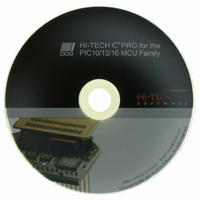SW500010 Microchip Technology, SW500010 Datasheet - Page 26

SW500010
Manufacturer Part Number
SW500010
Description
HI-TECH C PRO FOR PIC10/12/16
Manufacturer
Microchip Technology
Type
Compilerr
Series
PIC10/12/16r
Specifications of SW500010
Supported Families
PIC10, PIC12, PIC16
Core Architecture
PIC
Software Edition
Professional
Kit Contents
Software And Docs
Mcu Supported Families
PIC10/12/16
Tool Type
Compiler
Lead Free Status / RoHS Status
Not applicable / Not applicable
For Use With/related Products
PIC10, PIC12, PIC14, PIC16, PIC16E
Lead Free Status / Rohs Status
Lead free / RoHS Compliant
Other names
019P
778-1006
778-1006
778-1006
778-1006
- Current page: 26 of 502
- Download datasheet (3Mb)
The Compilation Sequence
randomly generated filename.
2.2.2 Generating Intermediate Files
The HI-TECH C PRO for the PIC10/12/16 MCU Family version compiler uses two types of in-
termediate files. For C source files, the p-code file (.p1 file) is used as the intermediate file. For
assembler source files, the relocatable object file (.obj file) is used.
you are using an IDE or make system that allows an incremental build of the project. The advantage
of a incremental build is that only the source files that have been modified since the last build need
to be recompiled before again running the final link step. This dependency checking may result in
reduced compilation times, particularly if there are a large number of source files.
PICC is capable of constructing libraries in a single step, so this is typically not necessary. See
Section
26
You may wish to generate intermediate files for several reasons, but the most likely will be if
You may also wish to generate intermediate files to construct your own library files, although
Intermediate files may also assist with debugging a project that fails to work as expected.
If a multi-step compilation is required the recommended compile sequence is as follows.
T
S
a_sb.lib and c_sb.lpp are to be compiled. To perform this in a single step, the
following command line can be used as a starting point for the project development.
PICC --chip=16F877A main.c io.c mdef.as sprt.obj a_sb.lib c_sb.lpp
This will run the C pre-processor then the parser with main.c as input, and then again
for io.c producing two p-code files. These two files, in addition to the library file
c_sb.lpp, are passed to the code generator producing a single temporary assembler
file output. The assembler is then executed and is passed the output of the code genera-
tor. It is run again with mdef.as, producing two relocatable object files. The linker is
then executed, passing in the assembler output files in addition to sprt.obj and the
library file a_sb.lib. The output is a single absolute object file, l.obj. This is then
passed to the appropriate post-link utility applications to generate the specified output
file format and debugging files. All temporary files, including l.obj, are then deleted.
The intermediate files: p-code and relocatable object files, are not deleted. This tutorial
does not consider the runtime startup code that is automatically generated by the driver.
Compile all modified C source files to p-code files using the --PASS1 driver option
UT RIAL
INGLE STEP COMPILATION
2.6.44
for more information.
The files, main.c, io.c, mdef.as, sprt.obj,
PICC Command-line Driver
Related parts for SW500010
Image
Part Number
Description
Manufacturer
Datasheet
Request
R

Part Number:
Description:
Manufacturer:
Microchip Technology Inc.
Datasheet:

Part Number:
Description:
Manufacturer:
Microchip Technology Inc.
Datasheet:

Part Number:
Description:
Manufacturer:
Microchip Technology Inc.
Datasheet:

Part Number:
Description:
Manufacturer:
Microchip Technology Inc.
Datasheet:

Part Number:
Description:
Manufacturer:
Microchip Technology Inc.
Datasheet:

Part Number:
Description:
Manufacturer:
Microchip Technology Inc.
Datasheet:

Part Number:
Description:
Manufacturer:
Microchip Technology Inc.
Datasheet:

Part Number:
Description:
Manufacturer:
Microchip Technology Inc.
Datasheet:










